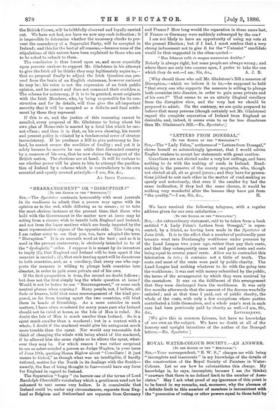"REARRANGEMENT" OR " DISRUPTION ?"
[TO THE EDITOR OF THE " SPECTATOR:q
Sia,—The Spectator contrasts honourably with most journals in its readiness to admit that a person may agree with its opinion as to the end, while differing as to means ; or to take the most obvious instance at the present time, that those who hold with the Government in the matter now at issue may be acting from a sincere wish to benefit both England and Ireland, and not from the baser motives which are freely imputed by the most representative organs of the opposite side. This being so, I am rather sorry to see that you, too, have adopted the term " Disruption." It is an uncouth word at the best ; and as it is used in the present controversy, is obviously intended to be of the " dyslogistic " order. I suppose it is meant by its inventors to imply (1), that England and Ireland will be torn apart if the measure is carried ; (2), that such tearing apart will be disastrous to both countries, and, as a corollary, that every one who sup- ports the measure is willing to plunge both countries into disaster, in order to gain some private end of his own.
If the first proposition is true, the second no doubt follows ; but does not the first simply beg the whole question at issue Would it not be better to use " Rearrangement," or some such neutral phrase when arguing Many people, not, I believe, all fools or knaves, hold that some rearrangement of the kind pro- posed, so far from tearing apart the two countries, will bind them in bonds of friendship. As a mere outsider in such matters, I have often wondered for many years past why Ireland should not be ruled at home, as the Isle of Man is ruled. No doubt the Isle of Man is much smaller than Ireland. So is a sprat much smaller than a mackerel; but in a contest with a whale, I doubt if the mackerel would give his antagonist much more trouble than the sprat. Nor would any reasonable fish think of charging the whale with being afraid of the mackerel, if he allowed him the same rights as he allows the sprat, what- ever they may be. For which reason I was rather •surprised to see so sober-minded a person as Judge Hughes, in your issue of June 19th, quoting Hosea Biglow about " Conciliate ! it just means bo kicked," as though what was an intelligible, if hardly rational, motive for the North in its dealings with the South— namely, the fear of being thought to fear—could have any force for England in regard to Ireland.
The Separation "bogey " (to borrow one of the terms of Lord Randolph Churchill's vocabulary which a gentleman need not be ashamed to use) seems very hollow. Is it conceivable that Ireland could be, under any circumstances, separate from Eng- land as Belgium and Switzerland are separate from Germany and France How long would the separation in these cases last, if France or Germany were suddenly submerged by the sea ?
I am not likely to have an opportunity of using my vote at the present Election ; but if I had, I must confess that a very strong inducement not to give it for the " Unionist " candidate would be that suggested in the often-quoted- "Hoc Ithacus relit et meow mercentnr Atridas."
Nobody is always right, but some people are always wrong ; and_ where there are only two courses open, I prefer to take the one which they do not.—I am, Sir, &c., A. J. B.
[Why should those who call Mr. Gladstone's Bill a measure of Disruption,—which we believe it to be,—be supposed to hold " that every one who supports the measure is willing to plunge both countries into disaster, in order to gain some private end of his own ?" That seems to us an utterly illogical corollary from the disruptive view, and the very last we should be prepared to admit. On the contrary, we are quite prepared to believe that many persons (though certainly not Mr. Gladstone)' regard the complete separation of Ireland from England- as desirable, and, indeed, it seems even to us far less disastrous than Mr. Gladstone's Bill.—En. Spectator.]


































 Previous page
Previous page